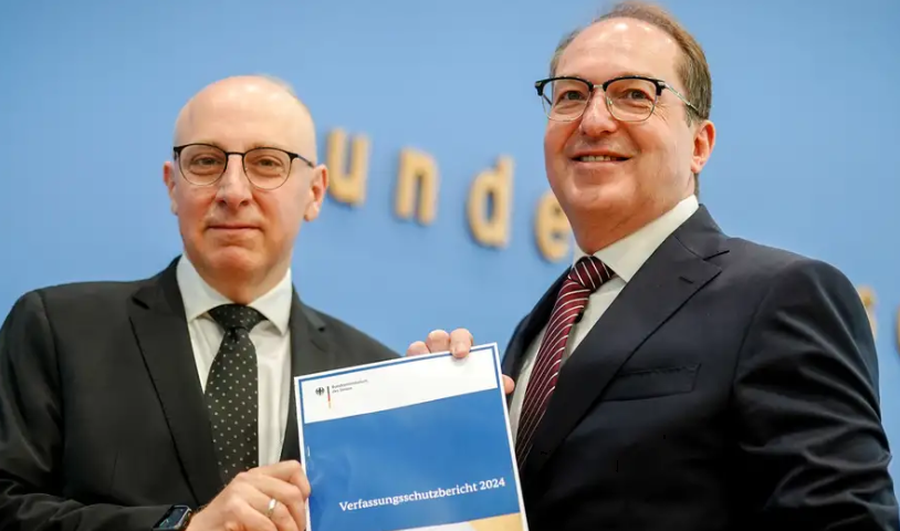
German Interior Minister Alexander Dobrindt (CSU) has only been in office for about five weeks, but he is aware that he is helping to lead an increasingly polarized country and society - where various extremists are gaining strength.
At the start of a press conference on the 2024 report of the Federal Office for the Protection of Constitutional Order, he showed a graph showing how much the potential of people on the far right has increased in Germany. Ten years ago, there were around 20,000 right-wing extremists, while now that number is more than double.
"The potential of right-wing extremists increased significantly in 2024, by about a fifth - from over 40,000 to more than 50,000. This is a frightening figure. For the first time, the number of right-wing extremists has exceeded 50,000," Dobrint said.
That's an expected number, he added. But it still represents a turning point. Especially since Germany's intelligence service estimates that about 14,500 of them are ready for violence. Among the latest arrests was a 14-year-old.
Another piece of news has recently attracted attention: in mid-May, the Federal Prosecutor's Office arrested five members of the suspected right-wing extremist terrorist group "Last Wave of Defense." In five states, police have taken action against a group that experts believe is currently perhaps the most radical of the right-wing extremist groups.
The youngest member arrested is only 14 years old. Among other things, the group is suspected of planning attacks on refugee shelters.
Young extremists instrumentalized by foreign powers
Young, quickly radicalized, determined to act - according to Alexander Dobrint, this pattern does not only apply to the right-wing scene. Almost every day, the minister says, attacks on the state are recorded. Russian forces, for example, are spreading disinformation and carrying out cyberattacks in ever-increasing numbers. This has increased since Russia invaded Ukraine in the spring of 2022. These external actors often also use young Germans. As Sinan Selen, vice president of the German Office for the Protection of the Constitution, explained, these young people are called "low-level agents," and their number is growing rapidly:
"These are very young people which is particularly worrying for us because they have not been ideologically formed over a long period of time, but they radicalise very quickly and are ready to act quickly."
China is also increasingly intensifying its espionage, which is mainly aimed at the economy. The number of left-wing extremists has also increased, although less - from 37,000 to 38,000 people.
The "Islamic State" is once again attracting more and more young Muslims.
After a long period of relatively low activity, violent Islamism in Germany is on the rise again. The domestic intelligence service now estimates that this potential includes around 28,000 people - of whom almost 10,000 are ready for violence.
Islamic terrorist militias such as Hamas and Hezbollah are trying to gain support from young people in particular from abroad. The "Islamic State" (IS) has become particularly active in Germany since the start of the war in Gaza, following Hamas's attack on Israel in October 2023.
In this regard, Sinen Selen said: "IS has successfully exploited the theme of the Middle East and the Gaza Strip - it has included it in the radicalization process and in its narratives and thus has been able to influence young people."
Dobrint: right-wing extremism is the biggest problem
But, according to Minister Dobrint, the biggest problem in Germany still remains right-wing extremism. He points out that around 20,000 people who are openly considered right-wing extremists are members of the Alternative for Germany (AfD), the strongest opposition party in the Bundestag.
The Federal Office for the Protection of Constitutional Order itself classified the party as confirmed right-wing extremist in its latest report, but it no longer uses this label because the AfD has initiated legal proceedings against it.
However, Dobrint could not avoid the question - should the AfD be banned?
Critics believe this would be a long, endlessly complicated process, with no sure chance of success before Germany's highest court - the Federal Constitutional Court in Karlsruhe. Such a request could be made, among other things, by the federal government itself, but Dobrint rejects it: "That the AfD is, in my opinion, a confirmed right-wing extremist party - I have never questioned it. I believe it is right to wage a political war with the AfD. And to make sure that we marginalize it politically. That means - solving the problems at home."
The political marginalization of the AfD - this is something that parties have not been able to do since the AfD was founded in 2013. On the contrary, the party has become increasingly radicalized and has gained more and more support from voters./ DW (A2 Televizion)











